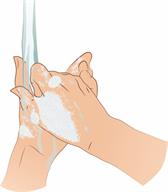Bird Flu, Adult
Avian influenza is also called bird flu. It's an infection caused by a germ called a virus. It's found in wild birds. It spreads easily among birds and is deadly to them. Birds and other animals can get bird flu from birds that are sick or from surfaces that have the germs on them. Bird flu can be spread from country to country when birds migrate or when birds are sold around the world as food.
Bird flu can cause people to get very sick. This is rare. It's also rare for bird flu to spread from person to person. But it can happen if you spend a lot of time with someone who's very sick with bird flu. Flu viruses can change, so there's a chance that bird flu could spread from person to person in the future.
What are the causes?
When birds get sick with bird flu, they can spread germs through:
Bird flu can then infect people who:
Come in contact with sick birds and then touch their eyes, nose, or mouth. This can happen with a bird that's dead or alive.
Breathe in dust that has germs in it.
Touch surfaces that have germs on them.
What increases the risk?
You're more likely to get bird flu if:
You come in close contact with birds.
You visit or live in a country where bird flu is common.
You eat raw or undercooked birds that have bird flu.
What are the signs or symptoms?
Common symptoms of bird flu include:
How is this diagnosed?
Bird flu may be diagnosed based on your symptoms, medical history, and an exam. You may also have tests. These may include:
How is this treated?
Bird flu may be treated with:
You may need to stay in the hospital. At the hospital, safety measures, called contact precautions, are taken to stop germs from spreading to others. This means:
You may stay in a room by yourself away from others.
Health care workers may wear protective clothes, gloves, masks, and goggles when they care for you.
Follow these instructions at home:
Activity
General instructions
-
Take over-the-counter and prescription medicines only as told by your provider.
-
Drink enough fluid to keep your pee (urine) pale yellow.
-
Use a cool mist humidifier to add moisture to the air in your home. This can make it easier for you to breathe.
How is this prevented?

-
Cover your mouth and nose when you cough or sneeze.
-
Wash your hands often with soap and water for at least 20 seconds. If soap and water aren't available, use hand sanitizer.
-
Stay home from work and school when you're sick. This can stop the spread of germs.
-
Get a flu shot every year. The flu shot can't prevent bird flu, but it can lower your risk of getting sick with the human flu and bird flu at the same time.
-
If you work with animals or have animals, wash your hands often. If there's a chance the animals have bird flu, wear protective clothes, gloves, masks, goggles, and boots.
-
If you think you've been exposed to bird flu, ask your provider about antiviral medicines that can help prevent infection.
Contact a health care provider if:
This information is not intended to replace advice given to you by your health care provider. Make sure you discuss any questions you have with your health care provider.
